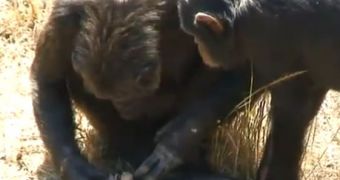Max Planck Institute researchers report for the first time, in detail, the way that a mother chimpanzee responds to the death of her infant.
The observations of Katherine Cronin and Edwin van Leeuwen, who have recently joined the MPI's Comparative Cognitive Anthropology group, give unique insight into the way that chimpanzees learn about death.
Not much is known about how primates react to the death of individuals close to them, what they understand about death and whether or not they mourn.
This report presents the mother's transitional period, as she learns about the death of her infant, and it is the first time that the process is presented in such detail.
The researchers replaced their interpretation with an extensive video, that allows viewers to make their own idea about what chimps understand about death.
Cronin says that “the videos are extremely valuable, because they force one to stop and think about what might be happening in the minds of other primates.
“Whether a viewer ultimately decides that the chimpanzee is mourning, or simply curious about the corpse, is not nearly as important as people taking a moment to consider the possibilities.”
The two researchers carried out their observations in May 2010, at Chimfunshi Wildlife Orphanage Trust in Zambia.
Here, wild-born chimpanzees who have been rescued from illegal trade live in some of the world's largest social groups and enclosures.
Chimpanzee mothers are in very close contact with their offspring for several years; they carry them around and nurse them until they are four to six years old.
This tight relationship continues even years after weaning, being one of the most important relationships a chimp has.
Cronin and Van Leeuwen filmed the behavior of a female chimpanzee with her 16-month-old infant, who had died.
The mother carries the dead body for more than a day before laying it down on the ground.
She then clearly and repeatedly approaches the body and holds her fingers against the infant's neck and face.
After staying with the body for almost an hour, she carried it over to a group of chimpanzees and watched them investigate it.
The next day, the mother stopped carrying her infant's body.
This research adds to previous studies, observing that the chimpanzee mother carries around her dead infant's body for days and even weeks.
The video is proof that the connection between the mother and the offspring in chimpanzees is very powerful.
“These data contribute to a small but growing body of data on how nonhuman primates respond to death,” say the researchers.
“We hope these objective accounts will continue to accumulate and eventually allow researchers to take a comprehensive look at the extent to which nonhuman primates understand death, and how they respond to it.”
Cronin and Van Leeuwen worked with Innocent Chitalu Mulenga, a Zambian researcher familiar with the behavior of these chimpanzees, and Mark Bodamer, a professor of Psychology at Gonzaga University in Washington State, USA.
Their commentary appears online in the American Journal of Primatology.

 14 DAY TRIAL //
14 DAY TRIAL //